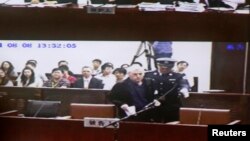Chinese prosecutors on Friday charged a British investigator and his American wife with illegally obtaining private information in a case that could be key to a bribery investigation against GlaxoSmithKline.
Peter Humphrey and Yu Yingzeng ran risk consultancy ChinaWhys, whose clients included GSK, and their testimony is being closely watched for any comments on the British drugmaker.
The couple's arrest over a year ago coincided with a government probe into allegations that GSK staff had funneled hundreds of millions of pounds through travel agencies to bribe local doctors and health officials to boost sales and raise prices.
The prosecutors, laying out the charges at the start of the trial, said the couple had illegally obtained more than 200 items of private information, including household registration data, real estate documents and phone records, and then re-sold the data. GSK was not mentioned in the charge sheet.
According to the court's official microblog, Yu said she did know that the third-party consultants ChinaWhys had hired to get the data had done so illegally.
“In other countries, we were able to conduct similar checks, including personal information and private transactions, legally through courts,” said Yu. “If we had known that it was illegal, my husband and I would have destroyed all traces of this information.”
While Chinese authorities have not openly connected the arrest of the couple to the GSK probe, Humphrey said in a note last year when he was already in detention that he felt “cheated” by GSK, adding that the drugmaker had not shared the full details of the bribery allegations.
A GSK spokesman has declined to comment on the trial. The drugmaker said in July that the issues relating to its China business were “very difficult and complicated.”
Foreign reporters were given unusual access to the trial after lobbying by the U.S. and British embassies.
The court's microblog was updated regularly. A television in the media room also momentarily broadcast a grainy image which showed Humphrey, dressed in a polo t-shirt and jacket, sitting down inside the courtroom. He appeared to look weary.
The couple's son, Harvey, was also in the courtroom with embassy officials.
Corporate data in demand
The trial has unnerved China's risk consultancy community, whose members are much in demand by multinationals and foreign investors for information on potential partners or firms in China, where such data is not easily available.
It also coincides with a growing number of Chinese anti-trust probes that have seen authorities raid offices of Western firms, highlighting the obstacles foreign companies face in navigating China's murky business world.
Foreign firms must adhere to anti-corruption laws while operating in China amid more stringent enforcement of the U.S. Foreign Corrupt Practices Act and an increase in the number of Chinese firms involved in overseas deals.
Humphrey is expected to plead guilty to the charges, which carry a maximum sentence of 3 years in jail. A verdict in the trial could take up to a month.
He worked for Reuters as a journalist in the 1980s and 1990s, and has previously apologized on state television for breaking any Chinese law.
In testimony read out in court, Humphrey said the due diligence services offered by ChinaWhys largely relied on publicly available records and interviews with executives.
“For projects that required background checks, we engaged a third-party consultancy that provided household registration data. We were only paying for their services; we never purchased or obtained such data directly ourselves,” he said, according to a transcript released by the court's official microblog.
Humphrey also said he had not sold the private information obtained.
China has in recent years moved to tighten its privacy laws. In 2009, it amended its criminal code to ban the transfer, sale or gathering of Chinese citizens' information by government firms and companies involved in telecoms, transportation, education and medical treatment.







